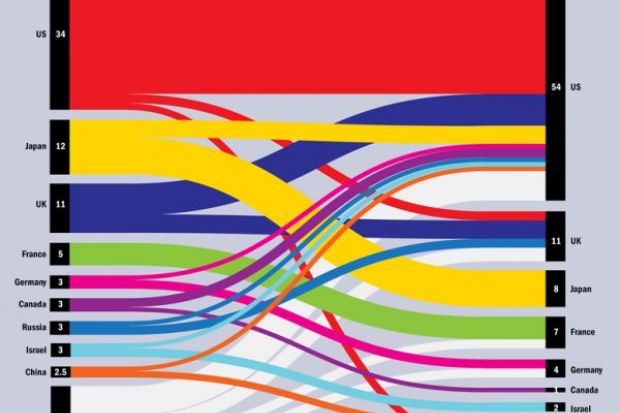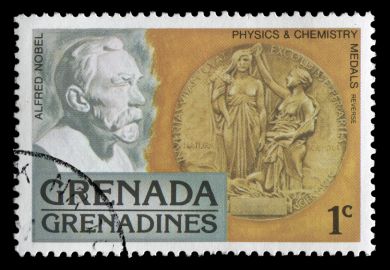View and/or download a high-resolution version
The US has been supremely successful at attracting Nobel prizewinning scientists from abroad, particularly the UK, while retaining those born in the country, analysis by Times Higher Education of the past 10 years of awards reveals.
Of the nine Nobel prizewinners announced earlier this month (excluding the literature and peace prizes), five went to academics who were born in the UK but are now based at US institutions.
“I think it was a phenomenon of the late 1970s and 1980s in particular,” explained Duncan Haldane, one of this year’s physics prizewinners, who was born in London but now works at Princeton University. “This year’s UK [born] laureates are all of that ‘lost to the UK’ generation,” he said.
Nearly nine in 10 of those born in the US who went on to win prizes were still based at US institutions when they received the accolade. Only a handful have left the country, although two have gone to the UK.
Meanwhile, 44 per cent of winners based at US institutions were born overseas – the country has poached seven from the UK, four from Japan, two from Canada and one each from Germany, China, Russia and Israel.
The UK, on the other hand, has also been good at attracting winners from abroad – including Russian-born Sir Andre Geim and Konstantin Novoselov, who are based at the University of Manchester and won the physics prize in 2010 for their work on graphene – but it has lost an equal number of UK-born scientists to the US.
The results do not necessarily reflect the current national strengths, however, because prizes are often awarded for work done decades previously. “In recent years, UK condensed matter physics has become vibrant again, and a lot of brilliant young Brits who came here [to the US] for postdoctoral opportunities went back to good positions in the UK to continue their careers rather than stay in the US,” Professor Haldane said.
But Martin Rees, the former president of the Royal Society, has warned that this resurgence of British science could be jeopardised if Brexit leads to immigration restrictions and difficulties collaborating with the rest of Europe.
POSTSCRIPT:
Print headline: Laureate land: America’s powerful Nobel attractions
Register to continue
Why register?
- Registration is free and only takes a moment
- Once registered, you can read 3 articles a month
- Sign up for our newsletter
Subscribe
Or subscribe for unlimited access to:
- Unlimited access to news, views, insights & reviews
- Digital editions
- Digital access to THE’s university and college rankings analysis
Already registered or a current subscriber? Login



